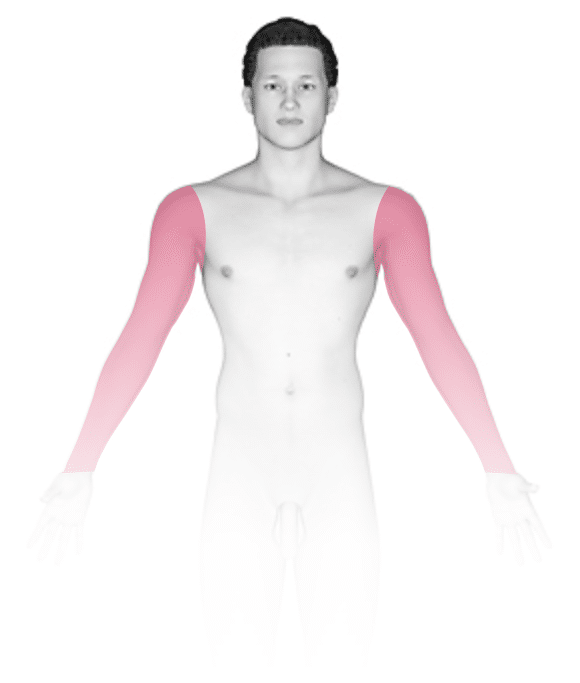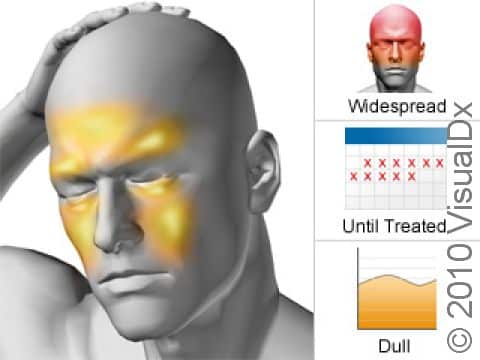Sinus Headache
Sinus headache involves head pain caused by irritation of the sinuses (the air-filled chambers in several bones in the face). The irritation can be due to sinus infection from viruses, bacteria, fungi, or other organisms, or it may be due to allergies. Sinus headaches are a common response your body may have to substances in the environment such as dust, pollen, ragweed, and grass, which can cause production of fluids that drain into the sinuses and cause congestion.
Who's At Risk?
People with chronic or severe allergies are at risk of sinus headaches in specific settings (eg, during particular seasons, being around pets).
Infection of the sinuses is possible in anyone, but it can be more common or more serious in people with compromised immune systems (eg, people with AIDS, cancer, diabetes, or older adults). Certain medical conditions may also make people prone to sinus infections, for example Sjögren syndrome, due to abnormal tissue lining of the sinuses. Injury to nasal passages and sinuses may also predispose a person to sinus infections and headaches.
Signs & Symptoms
Sinus headaches involve pressure or pain in the forehead, brow, below or behind the eye, behind the ear, and, sometimes, in the upper gums. This pain is typically constant and on one side, but it may affect both sides of the head. The person may be congested and have some difficulty breathing through the nose due to thick mucus. Blowing the nose, moving quickly, lying down, and bending forward often intensify the pain.
The area around the eyes and cheek may be swollen. Cough, runny nose, and itchy eyes and ears (if due to allergies) are additional possible symptoms.
A fever, sore throat, muscle aches, and fatigue may be present if the sinus infection is caused by a virus.
Self-Care Guidelines
Running a humidifier or taking a warm shower can help relieve symptoms, as can over-the-counter pain medications such as ibuprofen (eg, Advil, Motrin) or acetaminophen (eg, Tylenol). Over-the-counter decongestant sprays such as oxymetazoline (eg, Afrin) or phenylephrine (eg, Sudafed) and tablets such as pseudoephedrine (eg, Sudafed) are often helpful. If allergies are responsible for the sinus headache, antihistamines such as loratadine (eg, Claritin) or diphenhydramine (eg, Benadryl) or saline nasal sprays may help.
Avoiding the causes of your allergies or treating the allergic problem before exposure is helpful. Avoiding sudden changes in air pressure when having a sinus headache is helpful as well.
Treatments
In the case of allergies, your medical professional may prescribe medications to decrease fluid formation. For severe allergies, your medical professional may refer you to an allergy specialist.
If your medical professional suspects a bacterial infection, they may test for infection and prescribe antibiotics. Many sinus infections are caused by viruses that the body can effectively eliminate with time, though, and viral infections do not require antibiotics. If fungal or other organisms are causing your sinus headache, your medical professional will treat the infection appropriately.
Visit Urgency
If you have a known allergy that triggers your sinus headaches, you may be able to relieve symptoms with over-the-counter medications and, when possible, avoiding what causes the allergies.
However, call your medical professional if:
- You have sinus pain and develop a fever or you are immunocompromised.
- You develop new symptoms not typical of prior headaches.
- You have a particularly severe headache.
- You can’t think clearly or you lose consciousness.
- Your headache lasts longer than 5-6 days, particularly with symptoms that are worsening.
- Over-the-counter medications are not helping.
- Headache symptoms interfere with activities of daily living (eg, eating, bathing, working).
- You suspect you have a sinus infection (eg, you have a fever or there is thick, yellow or greenish mucus from the nose).
Immediately seek medical attention if you or someone you are caring for experiences:
- A stiff neck and a high fever with a headache.
- Loss of motor function (eg, your muscles don’t move normally), inability to think clearly, or convulsions with a headache.
- A head injury.
Last modified on October 7th, 2024 at 1:35 pm

Not sure what to look for?
Try our new Rash and Skin Condition Finder
